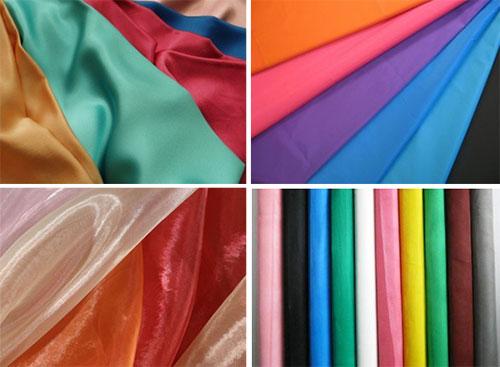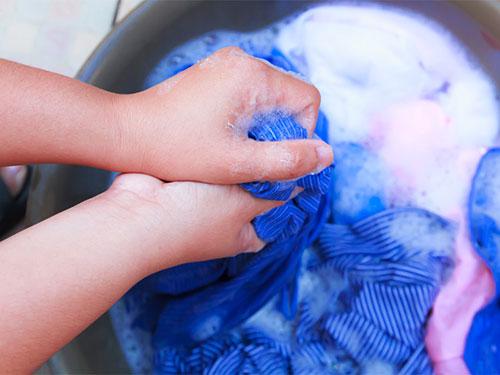Polyester is a versatile and practical material, leading in the world of synthetic fibers. The fabric does not wrinkle, is full of colors and is considered a long-liver in the closet. But in care it manifests itself capriciously and requires a delicate touch. We will figure out how to properly wash polyester in a washing machine, we will outline the basic rules for care.
Fabric Properties

Not only scarves, skirts and trousers are made of polyester, but they are also used for sewing coats, jackets and even umbrellas. To achieve an antistatic effect and increased strength, this material is taken as a basis and various synthetic and natural fibers are added.
The main danger is that synthetics do not withstand high temperatures and exposure to aggressive cleaners and bleaches. Soft powder and temperature not higher than 40 ºC - your guidelines.
Washing polyester in the washing machine

In order not to spoil the thing, follow these tips:
- Sort by color and fabric type. Fasten all buttons and zippers, check pockets. Delicate clothes should be placed in a laundry bag.
- If there are stains on the surface, remove the dirt before sending it to the drum.If necessary, set the option "soak" or "prewash".
- Optimum cleaning products soft gel or shampoo, gentle powder. For colored products, choose products marked "for color" or "Color".
- Choose between delicate or hand wash. For sportswear, the "Sports" program is suitable. The maximum number of revolutions is 800. If you load the machine to the maximum, it is advisable to enable the “extra rinse” option.
- Add conditioner or softener to maintain volume and softness.
Treat outerwear with care, as machine washing promotes loss of shape and can ruin clothes. It is advisable to wash a polyester coat by hand, as the resulting wrinkles are difficult to remove. Raincoats and jackets without filler are less picky and can withstand machine washing without significant deformation.
Hand wash polyester

Prepare a workplace: a basin is suitable for small things, send outerwear straight to the bath. Take warm water (up to 40 ºC) and dissolve the powder. For hand washing, a soft liquid composition will do, since the granular powder is more difficult to dissolve in water, and after a weak rinse streaks may appear on the fabric. Dip the clothes in the soap solution, if necessary, soak for a maximum of half an hour. Arm yourself with a soft brush and treat contaminated areas.
Unfold the item at the bottom of the tub and rinse out of the shower with warm water. Rinse thoroughly several times until the soapy water is gone. Gently wring out and let excess moisture drain. Outerwear is not wrung out, but hung on a coat hanger.
Drying and ironing polyester clothes

To speed up the drying process, use a terry towel.Unfold it on a flat horizontal surface, lay down and blot clothes. Then place the item on the clothes dryer or leave it on a coat hanger. Do not hang things in bright sunlightas they quickly lose their color and shape.
The material practically does not wrinkle, but if necessary, the following method will help smooth out the wrinkles. Preheat the iron to medium temperature, set the steam mode (using steam) and iron the fabric through cheesecloth or light cotton.
